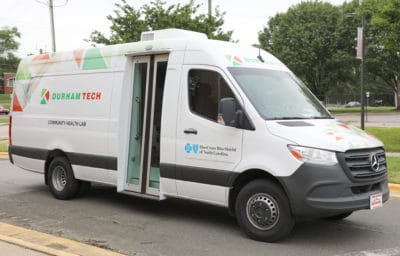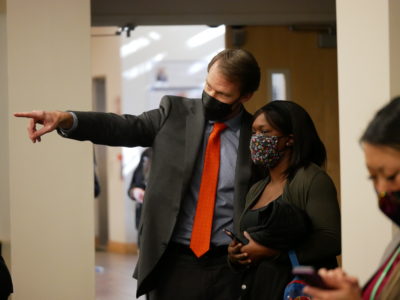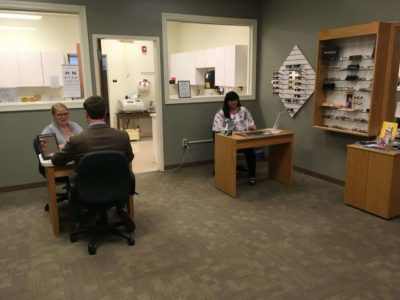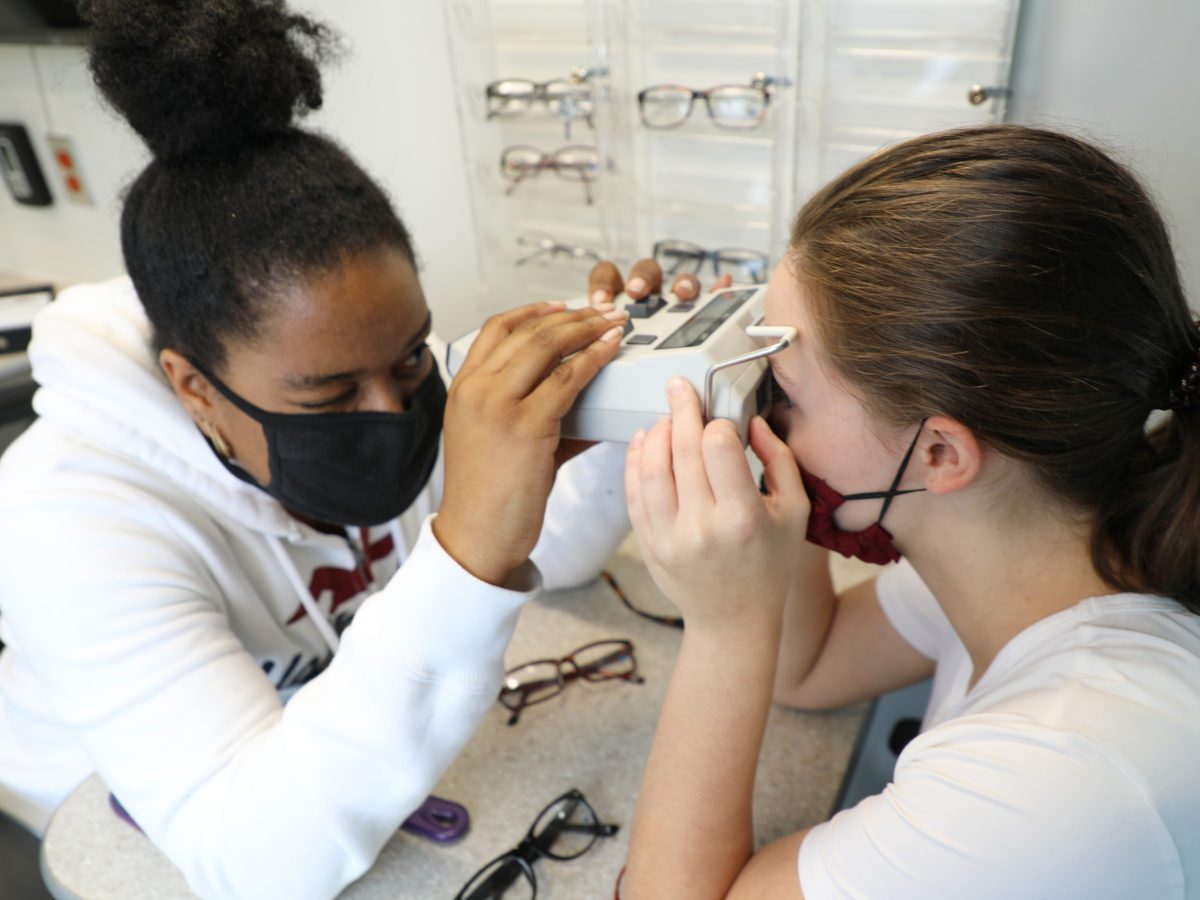
Share this story
- "That's the outside of the box thinking that is going to be required if we're going to solve the health care problems of today," Durham Tech's dean of health and wellness said about the mobile health lab. "We've got to think differently." #impact58 @durhamtech
- The mobile health lab is one of Durham Tech's health partnerships meant to mitigate challenges for the community, workforce, and students. #impact58 @durhamtech
|
|
The first summer of the pandemic, Durham Technical Community College received the then-largest grant in the college’s history: $1 million from Blue Cross and Blue Shield of North Carolina.
The mission? To launch a community mobile health lab.
Since June 2020, the mobile health lab has provided needed community services and educational experiences. The van allows students and supervising practitioners to travel where vision care is most needed in Durham and Orange counties — providing free glasses, screenings, and health education to elementary-aged children while also giving Durham Tech students crucial hands-on practice.
“That’s the outside of the box thinking that is going to be required if we’re going to solve the health care problems of today,” said Melissa Oakley Ockert, Durham Tech’s dean of health and wellness. “We’ve got to think differently.”
The mobile lab is one of Durham Tech’s health partnerships meant to mitigate challenges for the community, workforce, and students. Education for health fields is often expensive, even as nursing shortages strain the state’s health infrastructure. Access to health care and insurance is the second highest health priority in Durham County, according to a 2021 report.
By the numbers:
- 1,000+ patients served
- 800+ eye exams
- 775 pairs of glasses given
- 150+ health screenings/physicals
- Hosted 100+ students
- Provided mental health first aid training to 100+ people
- 40+ community partnerships
- Clinics once a week
- 2023: Plans to launch dental screenings
In addition to partnering with Blue Cross NC to make the mobile health lab a success, Durham Tech also works with Duke Health, UNC Health, Duke Outpatient Clinic (DOC), Durham Public Schools, Duke Sanford School of Public Policy, and many community organizations. Dr. Alex Cho, assistant professor of medicine and the new medical director of the DOC, leads the lab’s supervising practitioners. To date, 14 medical residents at Duke have assisted Cho on the van, Oakley Ockert said, along with many Durham Tech students.
Such collaborative solutions “apply more innovative and strategic approaches” to workforce and education challenges, said Debra Clark Jones, Duke Health’s associate vice president for community health.
University Health System partnerships
Durham Tech is leveraging Duke and UNC Health partnerships to develop a larger, more diverse pipeline of health care workers. The community college currently partners with the following university programs:
- Duke Outpatient Clinic
- Duke University School of Nursing
- Duke HomeCare& Hospice
- Duke’s School of Medicine
- Central sterile processing course with UNC Health
The college is also working to expand those partnerships. At UNC, the college plans to offer a pharmacy technician apprenticeship, and at Duke, a case management certificate. Since 2016, six cohorts of Duke Health employees took the community college’s Nurse Aide I class. That initiative resulted from Duke wanting to help employees move up to highly needed nursing positions. Moving forward, Duke Health and Durham Tech hope to further coordinate to address nursing shortages.
North Carolina could be among the top five states for nursing shortages by 2026 if current trends continue. By 2033, the state could have a shortage of nearly 17,500 nurses, according to N.C. Nursecast data. Community colleges like Durham Tech are working to lessen the gap.
“Prior to COVID, the pipeline was seriously disrupted. Now it is really disrupted, and it’s so hard to catch up.”
Pamela Edwards, Duke University Health System’s assistant vice president of nursing education, practice, and research
A large contributor to nursing shortages is the declining number of educators to train students. The vacancy rate nationwide for faculty positions increased from 6.5% in 2020 to 8% in 2021, according to a survey released in September 2021 by the American Association of Colleges of Nursing. U.S. nursing schools turned away more than 80,000 qualified applicants for baccalaureate and graduate nursing programs in 2019, the association reported, mostly due to faculty shortages.
Leveraging Duke Health faculty to train more community college students — and, in turn, reduce worker shortages — is mutually beneficial, Edwards said.
Diversity has ‘an immeasurable impact’
The partnerships also help increase workforce diversity, Clark Jones said.
Community colleges enroll some of the most diverse student populations. They also consistently have lower rates of students who return for a second year, compared with four-year colleges.
Meeting students where they are is an important part of the work, Oakley Ockert said. That means helping students stay in college through financial, transportation, and child care challenges.
“This pipeline discussion is extremely exciting to me, because the primary focus of my role is to heighten the focus of Duke Health Care around the social determinants of health,” Clark Jones said. “When it comes to the impact on the elimination of health disparities, a diverse workforce is so important. And for us to be able to leverage those demographics that exist at Durham Tech — and the supports to be in place for students to be successful — really is an immeasurable impact on our patients’ health as well.”
Research shows the quality of care improves when health workforces reflect the demographics of their communities.
Only 5% of physicians are Black, according to the Association of American Medical Colleges, yet 13.6% of the U.S. population is Black. In 2020, the maternal mortality rate for non-Hispanic Black women was nearly three times the rate for non-Hispanic white women, according to the CDC’s National Center for Health Statistics. Breast cancer mortality is about 40% higher among Black women than white women, a 2014 CDC report found.
Organizations like the NC Alliance for Health Professions Diversity (NCAHPD) say increasing health care racial/ethnic diversity can reduce disparities to create “a future health care workforce that is increasingly proficient in cross-racial and cross-cultural interactions.”
In Durham Tech’s Associate Degree Nursing program, 40% of students are Black and 14% are Hispanic, according to enrollment data. For practical nursing, 69% of students are Black and 9% are Hispanic. In Durham, according to Census data, more than 35% of the population is Black and nearly 14% is Hispanic. The health care workforce across the state is generally less diverse than the general population.
“When we partner with Durham Tech, whether it’s for incumbent workers or to recruit students out of the pipeline, we always are able to secure more diverse staff,” Edwards said. “And that just helps our patients and families feel more comfortable.”
Durham’s health and economy
Durham Tech’s health offerings also add to the area’s economy.
The college supports more than 4,000 jobs annually and adds $305.9 million to the service region. According to Durham Tech, it is the only community college in the state that serves two tertiary-care level hospitals in the UNC and Duke Health systems. The college also serves the Durham VA Health Care System and long-term care facilities.
The college continues working to expand its health care impact.
In November, Durham residents will vote on a $112.7 million bond referendum for the college. If approved, those funds will build high-quality training hubs for major regional health care and life sciences industries.
About $74 million would go to an 86,000-square-foot building to expand and consolidate all Allied Health Programs into one building. A little more than $35 million would build a 35,280-square-foot building to house life sciences industry training and education.
Last February, Durham Tech also announced plans for an affordable housing neighborhood near campus. The development would provide 124 affordable housing units, with leasing applications set to open in fall 2024. More than 50% of Durham Tech students said they experienced housing insecurity in the previous 12 months, according to a 2019 survey of 700-plus students. Affordable housing is Durham County’s top health priority, according to the 2021 health report.
“I’m really inspired by that type of out of box thinking that Durham has, even with that initiative,” Clark Jones. “I’m always thinking about health and optimal health within our community.”
Beyond the numbers
Some of the impacts the college makes are harder to measure, Oakley Ockert said. Statistics about Durham Tech’s contributions to the economy, for instance, don’t necessarily highlight the ripple effects made by programs like the mobile health lab.
“Our students are able to rotate on that van and learn from Dr. Cho and his team and have a community health experience that they would never have gotten otherwise,” Oakley Ockert said. “And we have students that have now decided that they want to go into community medicine, family medicine because of their experience on the van.”
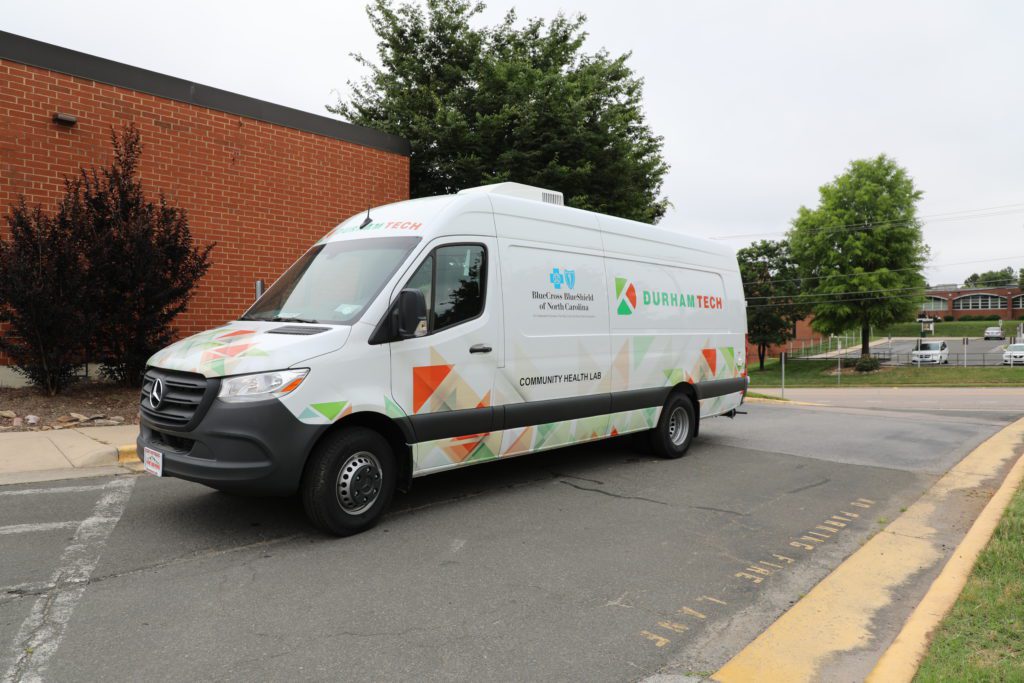
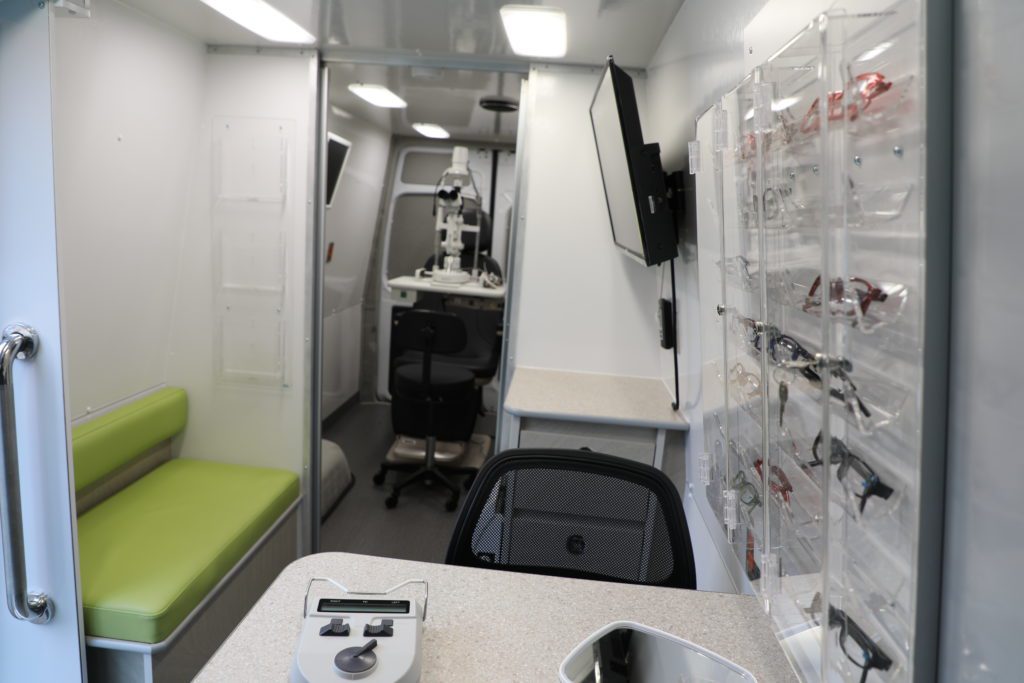
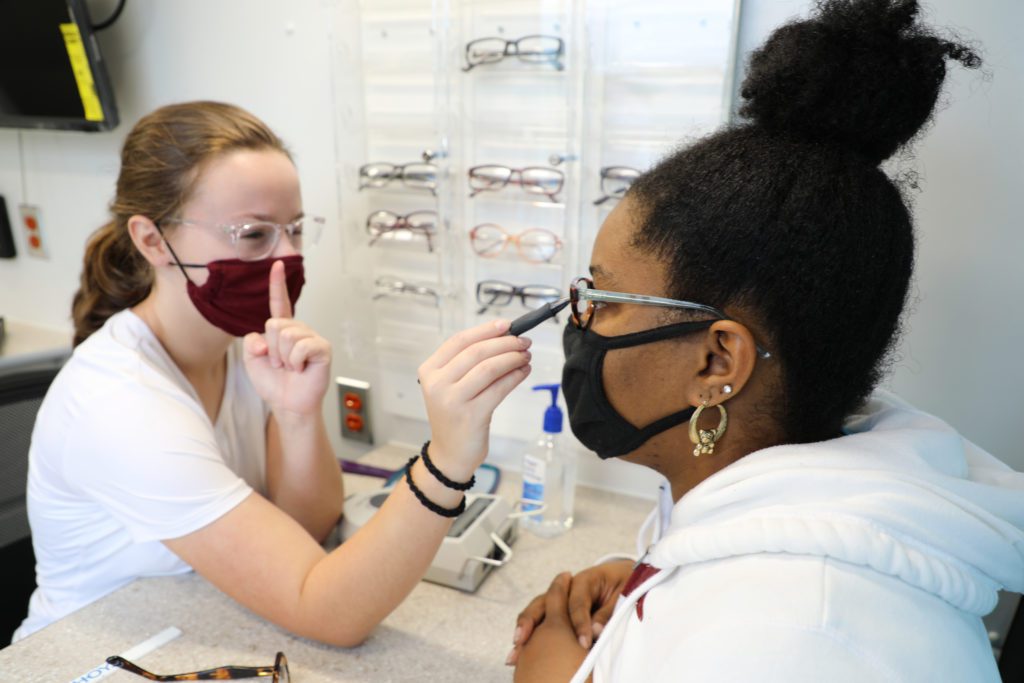
One such student, Kathleen Luxmore, 29, enrolled at Durham Tech last fall in EKG Technician and Monitoring with the intent of becoming a physician assistant. She frequently served on the college’s mobile lab during that time. Eventually, she decided to instead pursue a Doctor of Medicine degree to provide mobile care in underserved communities.
“The experience of being able to volunteer in patient care is potentially really eye opening, because it may not be something that’s immediately apparent — knowing that kind of medicine is possible, outside a hospital setting,” Luxmore said. “And because it is such a necessary way to practice and the patients really need it, the more people know about it and get the inclination to practice, the better.”
Last summer, Luxmore moved to New Jersey to continue immuno-oncology research while prepping to take the MCAT. For three months after the move, she flew to Durham once a month to keep volunteering at the health lab.
Laughing, she explained: “Because I loved it so much.”



